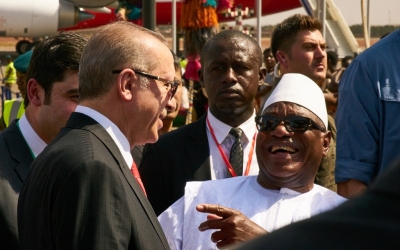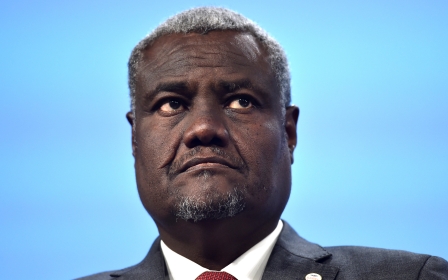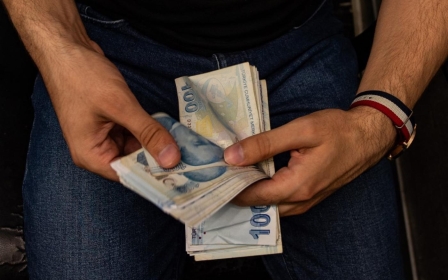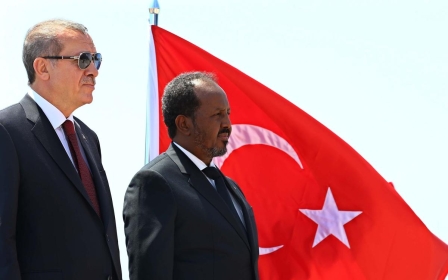Turkey and its drones in Africa - a switch to hard power?
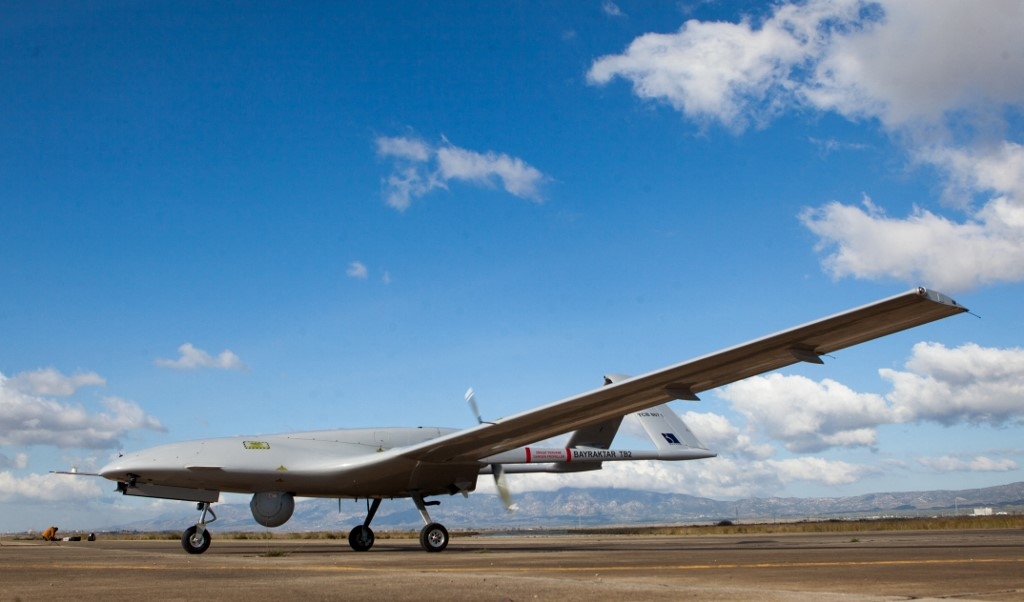
Turkish President Recep Tayyip Erdogan’s four-day trip to Africa this week, with stops in Nigeria, Angola and Togo, barely registered in the Turkish news.
Instead, Turkish state-run outlets took on a PR tone, stressing the country’s humanitarian efforts and colonialism-free approach to the continent, and echoing Erdogan’s own comments in the Angolan capital of Luanda on Monday.
“As Turkey, we reject western-centred orientalist approaches to the African continent,” he told Angolan President Joao Lourenco. “We embrace the peoples of the African continent without discrimination.”
Turkey’s courtship of Africa is not new. With its geographic proximity, large consumer base and natural resources, its countries have offered Turkey an opportunity to realise both its domestic and regional aims.
Over the past two decades, Turkey has steadily expanded its diplomatic missions, boosted trade volume and increased humanitarian efforts in African countries.
Now with a string of drone sales spreading Turkish drones across Africa and recent interventions in two African countries, some analysts say Turkey may be moving beyond its soft power approach to become a game-changing actor in African politics.
“Its role in Somalia, West Africa and, more recently, its military engagement in Libya clearly shows that Turkey wants to expand its influence across the continent,” Ibrahim Bachir Abdoulaye, a researcher on Turkey-Africa relations at the University of Bayreuth in Germany told Middle East Eye.
Spread of Turkish drones
In recent years, Turkish drones have gained popularity in the international market, attracting even western countries like Ukraine, Poland and reportedly even the UK.
They have also spread to African shores. In late September, the first batch of Turkish armed drones arrived in Tunisia despite tensions in bilateral relations after Tunisian President Kais Saied seized control of the country in July.
Morocco was next, expanding its military inventory with Turkish drones. This procurement came as tensions flared between Algeria and Morocco - and despite Turkey’s seemingly good relations with Algeria.
Earlier this month, African Intelligence reported that the Rwandan army has been eyeing Turkish drones for its military operations in Mozambique. Despite no official comment from either side about the drone sales, Turkey has already developed relations with the country, constructing Rwanda’s biggest indoor stadium in its capital Kigali.
Another country looking at Turkish drones is Ethiopia. While details have been kept under wraps as a result of the rift between Addis Ababa and Cairo over the Grand Ethiopian Renaissance Dam project, Reuters reported last week that Ethiopia and Turkey had reached a sales agreement.
With this deal, Turkey would add yet another investment to its Ethiopia portfolio, which already includes textile factories, a railway and several infrastructure companies, and makes Turkey the second-largest foreign investor in the country behind China.
Finally, Nigeria has expressed interest in Turkish drones, with Bello Muhammad Matawalle, the governor of the state of Zamfara, saying they would help the Nigerian army to combat organised crime.
Turkey’s interest in Africa
Turkey’s efforts to expand its reach in Africa date back to 2005, which the Turkish government declared “the year of Africa”. With it came the launch of diplomatic missions, business deals and flights.
Over the past 19 years, Erdogan has travelled to nearly 30 African countries, more visits than any other non-African leader. Turkey has increased its diplomatic missions on the continent from 12 in 2002 to 43 in 2021, while Turkish Airlines flies to 60 destinations in 39 different African countries, making Istanbul a transit hub between Africa and the world.
Moreover, the value of bilateral trade increased to $25bn last year, a figure that stood at around $4.3bn when Erdogan came to power in 2003.
'Turkey is attracted by the immense wealth underground and Africa's economic potential'
- Ibrahim Bachir Abdoulaye, University of Bayreuth
Turkey has also been using some of its state-run institutions for humanitarian and educational aid. For instance, the Turkish government agency which is responsible for helping Turks living abroad has awarded nearly 6,000 African students with full scholarships to Turkish universities over the past decade.
Experts say Turkey’s focus on Africa has been about achieving economic success.
“Turkey is attracted by the immense wealth underground and Africa's economic potential with a market of over a billion people,” said Abdoulaye, adding that there are significant opportunities, in particular, for medium and large Turkish companies.
However, Emre Calıskan, a fellow at the Foreign Policy Center in Ankara, said that Turkey has mostly invested in medium-sized companies, rather than larger ones with higher volumes of trade.
“The boom in Turkish-African trade volume is an illusion,” he said.
But he said that defence industry sales would be a real boom for Turkey’s investments in Africa because that kind of trade requires “know-how sharing, technology transfer and deeper cooperation”.
A new African strategy?
With its ongoing investments in Africa, and particularly with its drone sales, which have changed the balance of power in favour of the buyers, observers are asking whether Turkey is now competing with international powers such as France, the US, Russia and China for influence.
This question has come to the fore since Turkish drones enabled Libya’s internationally recognised government to halt eastern commander Khalifa Haftar’s advance towards the capital Tripoli last year.
Similarly, the Turkish drone-backed Azerbaijani army managed to save its occupied lands from Armenia in 2020, in the war for Nagorno-Karabakh. As several analysts pointed out, Turkish drones helped change the tide of the war.
'Turkey has never had such a "do what I want" or "do as I say" policy with Africa'
- Volkan Ipek, Yeditepe University
Turkey’s success in Libya, said Abdoulaye, revealed the country’s capacity to “face its rivals and establish economic and political influence over certain African countries”.
Calıskan agreed, calling Libya a turning point after which Turkey started becoming a military power rather than simply offering humanitarian aid in Africa.
“Turkey has a vision now. Ankara wants to develop its relations with Libya’s neighbouring countries and to establish military bases to become a military power in the continent’s north,” he said.
But he believes that Turkey is not interested in holding military power beyond the Libyan sphere because of the financial costs it would incur. “For instance, China sells weapons to African countries but gives loans as well. Turkey is unable to do so due to its deteriorating economy,” he said.
Volkan Ipek, an assistant professor at Yeditepe University in Istanbul, said he believes Africa is a “rehabilitation field” for Turkish foreign policy, which has been stalemated with developments in its neighbouring countries, primarily in Syria.
Turkey, Ipek said, has the upper hand against European powers in the continent because it doesn’t have a colonial legacy. “Turkey has never had such a 'do what I want' or 'do as I say' policy with Africa,” he said.
But despite this advantage, he said he doesn’t believe Turkey has a bigger strategy in Africa beyond bilateral trade agreements.
In any case, Erdogan is keen to deepen Turkey’s relationship with African countries. His last stop on Wednesday was oil-rich Nigeria, where he signed seven agreements with his counterpart Muhammadu Buhari to boost bilateral trade and investment worth over $2bn.
This article is available in French on Middle East Eye French edition.
Middle East Eye propose une couverture et une analyse indépendantes et incomparables du Moyen-Orient, de l’Afrique du Nord et d’autres régions du monde. Pour en savoir plus sur la reprise de ce contenu et les frais qui s’appliquent, veuillez remplir ce formulaire [en anglais]. Pour en savoir plus sur MEE, cliquez ici [en anglais].


